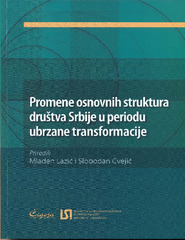Uloga sive ekonomije u klasno-slojnom pozicioniranju građana Srbije nakon 2000. godine
The role of informal economy for class positioning of Serbian citizens after 2000
| dc.contributor | Lazić, Mladen | |
| dc.contributor | Cvejić, Slobodan | |
| dc.creator | Stokanić, Dragana | |
| dc.date.accessioned | 2023-03-14T11:17:13Z | |
| dc.date.available | 2023-03-14T11:17:13Z | |
| dc.date.issued | 2013 | |
| dc.identifier.isbn | 978-86-531-0020-9 | |
| dc.identifier.uri | http://ipir.ipisr.org.rs/handle/123456789/917 | |
| dc.description.abstract | The interest for scientifi c exploration of informal economy appeared in the 70s of the 20th century and it has not decreased yet. The fl exible relations on the labor market have an increasing importance and they facilitate the rise of unregulated labor market. In the circumstances of the recession and widespread social changes, the rate of informal practices has increased. This paper is dealing with the role of informal economy for class positioning of different social classes in the last two decades. Firstly, it will be investigated social-economic standing of individuals who are engaged in the informal economy. Secondly, it will be presented what types of activities have dominated on the informal market, as well as motives for participating in the grey economy among members of different social groups. In this analysis, the results from the survey organized in 2000 and 2012 will be used. These surveys are held by the Institute for sociological research, Faculty of Philosophy, Belgrade. | sr |
| dc.description.abstract | Interesovanje za naučna istraživanja neformalne ekonomije javilo se 70-ih godina 20. veka i još uvek se nije smanjilo. Fleksibilni odnosi na tržištu rada imaju sve veći značaj i oni olakšavaju porast neregulisanog tržišta rada. U okolnostima recesije i široko rasprostranjenih društvenih promena, stopa neformalnog praksa se povećala. Ovaj rad se bavi ulogom neformalne ekonomije za klasu pozicioniranje različitih društvenih klasa u poslednje dve decenije. Prvo, hoće biti istražen socijalno-ekonomski položaj pojedinaca koji su angažovani u neformalnoj ekonomiji. Drugo, biće predstavljeno koje vrste aktivnosti su dominirale na neformalnom tržištu, kao i motivi za učešće u sivoj ekonomiji među pripadnicima različitih društvenih grupa. U ovoj analizi rezultati ankete organizovane 2000 a koristiće se 2012. Ove ankete sprovodi Institut za sociološka istraživanja, Filozofski fakultet, Beograd. | sr |
| dc.language.iso | sr | sr |
| dc.publisher | Beograd : Institut za sociološka istraživanja, Univerziteta u Beogradu | sr |
| dc.relation | info:eu-repo/grantAgreement/MESTD/Basic Research (BR or ON)/179035/RS// | |
| dc.rights | openAccess | sr |
| dc.source | Promene osnovnih struktura društva Srbije u periodu ubrzane transformacije | sr |
| dc.subject | ekonomija | sr |
| dc.subject | economy | sr |
| dc.subject | Srbija | sr |
| dc.subject | Serbia | sr |
| dc.title | Uloga sive ekonomije u klasno-slojnom pozicioniranju građana Srbije nakon 2000. godine | sr |
| dc.title | The role of informal economy for class positioning of Serbian citizens after 2000 | sr |
| dc.type | conferenceObject | sr |
| dc.rights.license | ARR | sr |
| dc.citation.epage | 197 | |
| dc.citation.spage | 178 | |
| dc.description.other | Radovi su predstavljeni na naučnom skupu Stratifi kacijske promene u Srbiji, na osnovu rezultata empirijskog istraživanja koje je Institut za sociološka istraživanja izveo u okviru projekta Izazovi nove društvene integracije u Srbiji: koncepti i akteri | sr |
| dc.identifier.fulltext | http://ipir.ipisr.org.rs/bitstream/id/2865/The_role_of_informal_economy_for_class_positioning_of_Serbian_citizens_after_2000_2013.pdf | |
| dc.identifier.rcub | https://hdl.handle.net/21.15107/rcub_ipir_917 | |
| dc.type.version | publishedVersion | sr |

